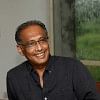
Kazi Khaleed Ashraf
Kazi Khaleed Ashraf is an architect and urbanist, and director-general of Bengal Institute for Architecture, Landscapes and Settlements.
Kazi Khaleed Ashraf is an architect and urbanist, and director-general of Bengal Institute for Architecture, Landscapes and Settlements.
The first experience of the great river Padma is nothing less than overwhelming, and slightly terrifying. I first came to face the mighty river as a young lad in my teens sometime in April of the momentous year of 1971. My first sighting came with two terrors. My father was fleeing Dhaka with the family with the hope of crossing the river to escape the brutal onslaught of the Pakistan army. Arriving at the banks, there was the Padda (Padma) before us with its glorious panorama. It seemed like an oceanic river, with no sight of the other side, and the frightening prospect of crossing it.
Since the 1960s, Prof Abdur Razzaq wielded considerable influence on the academic and literati circle of his time,.
Claiming that Dhaka is an island is an earnest call for an ecological and nature-oriented restoration of the city, and to experience.
Before the construction of the beribadh in the early 1990s, the nameless water body was part of the overflow zone of the Turag River.
It is no wonder that a vast population of Dhaka are generally disgruntled with where they are.
The city is perhaps the greatest innovation carried out by humans. Although nature has been used as an analogy in conceiving the fabric of the city, there is no such thing as the “city” in nature.
A city is a web of facilities and opportunities in which different agencies and communities lay stakes, push boundaries, and make bullish claims of making things better.
Here was a river that was larger than life, larger than anything I had encountered before. Flowing gloriously and indifferently, the river presented a mythic scale against which I felt terribly puny.
One striking aspect of the DAP document is the geographical scope of Rajuk, in how it signals an expanded Dhaka.
The Detailed Area Plan (DAP) for 2022-2035, produced by Rajuk, is a radical and innovative document in the planning history of Dhaka.
If you want to fall in love with the city—walk. This simple aphorism opens up a full discourse on how we can make our cities liveable and civic, and how we might live together as a collective.
If the city is the new challenge of the time, the “edge” of the city is at the heart of it.
February 20 was the 120th birth anniversary of the famed American architect Louis I. Kahn whose monumental architectural creation is the National Assembly (Sangsad Bhaban) of Bangladesh.
The National Capital Complex in Dhaka, designed by Louis Kahn, is an epic work in the annals of modern architecture. Even after sixty years of its conception, Kahn’s complex remains a wondrous phenomenon that is continuously renewing the purposes of architecture.
When al-Mansur laid the foundation of Baghdad in 762 on the banks of the Tigris, he imagined an ideal city in the shape of a round plan.
No one doubts the magnitude of complexity that shrouds Dhaka, this city of 16 million poised between being the worst liveable and an economic colossus.